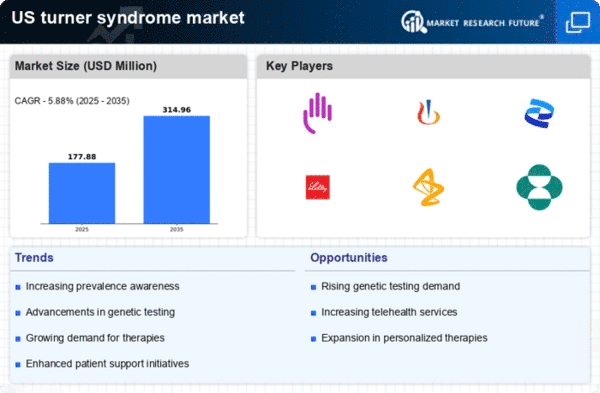Increased Research Funding
The allocation of increased research funding towards Turner syndrome is a critical driver for the turner syndrome market. Government and private organizations are recognizing the need for more comprehensive studies to understand the complexities of this condition. Funding initiatives have been established to support research into the genetic, psychological, and social aspects of Turner syndrome. This influx of resources is expected to lead to the development of new therapies and interventions, thereby expanding the market. The turner syndrome market industry stands to gain from these advancements, as innovative treatments emerge from ongoing research efforts.
Enhanced Treatment Protocols
The development of enhanced treatment protocols for Turner syndrome is a significant driver for the turner syndrome market. Recent clinical guidelines emphasize personalized treatment plans that address the unique needs of each patient. This shift towards individualized care is likely to improve patient outcomes and satisfaction. The market is witnessing a rise in the availability of hormone replacement therapies and other targeted treatments, which are essential for managing the symptoms associated with Turner syndrome. As healthcare providers adopt these new protocols, the turner syndrome market industry is expected to experience growth, driven by the demand for effective and tailored therapeutic options.
Innovations in Genetic Testing
Advancements in genetic testing technologies are significantly influencing the turner syndrome market. The introduction of non-invasive prenatal testing (NIPT) has improved early detection rates, allowing for timely diagnosis and intervention. This innovation is crucial, as early management can lead to better health outcomes for individuals with Turner syndrome. The market for genetic testing services is projected to grow, with estimates indicating a compound annual growth rate (CAGR) of around 10% over the next few years. Consequently, the turner syndrome market industry is likely to see increased investment in genetic testing solutions, enhancing the overall landscape of care for affected individuals.
Growing Patient Advocacy Groups
The emergence and growth of patient advocacy groups dedicated to Turner syndrome are shaping the turner syndrome market. These organizations play a vital role in raising awareness, providing resources, and supporting individuals and families affected by the condition. Their efforts contribute to a more informed public and healthcare community, which can lead to earlier diagnosis and improved treatment options. As these groups continue to expand their reach, they are likely to influence policy changes and funding allocations, further driving the turner syndrome market industry. The collaboration between advocacy groups and healthcare providers may enhance the overall support system for patients.
Rising Incidence of Turner Syndrome
The increasing incidence of Turner syndrome in the US is a notable driver for the turner syndrome market. Recent estimates suggest that approximately 1 in 2,500 live female births are affected by this condition. This rising prevalence necessitates enhanced diagnostic and therapeutic interventions, thereby expanding the market. As awareness grows among healthcare professionals and the general public, more cases are likely to be identified, leading to a greater demand for specialized treatments and support services. The turner syndrome market industry is thus positioned to benefit from this trend, as healthcare providers seek to address the needs of affected individuals through tailored medical solutions.
















